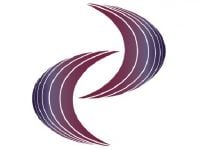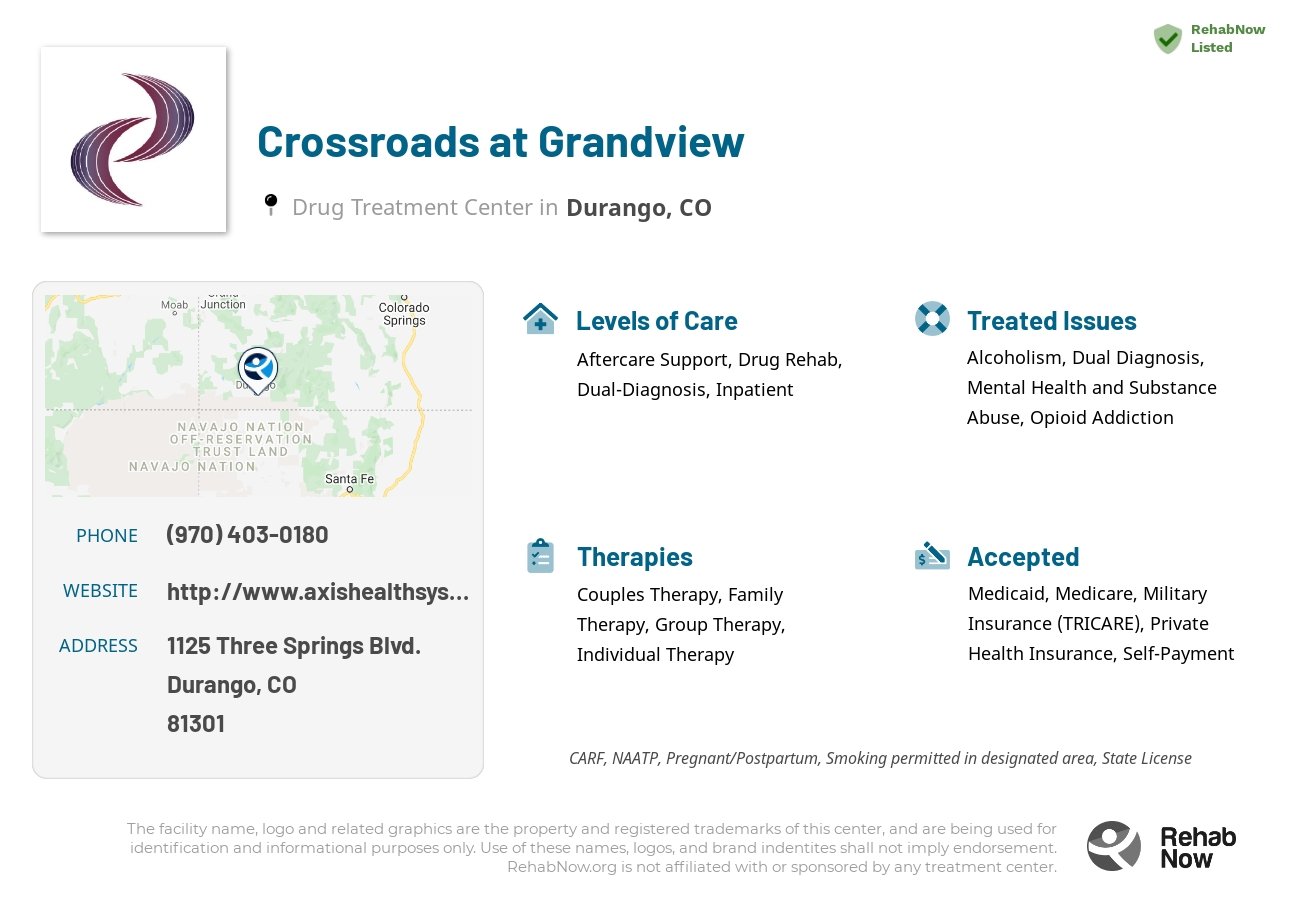Crossroads at Grandview
Drug Rehab Center in Durango, Colorado
Crossroads at Grandview is an addiction treatment facility in Durango, Colorado offering evidence-based treatments, experiential therapies, and psychoeducational groups to help individuals address the root causes of their substance abuse and work towards lifelong recovery, as well as providing academic courses through their Recovery Academy.
About This Colorado Facility
Crossroads at Grandview in Durango, Colorado is an addiction treatment facility that was founded in 1960- making it one of the longstanding providers of addiction treatment in the region. This facility primarily focuses on treating individuals who are suffering from alcoholism, opioid addiction, dual diagnosis, drug addiction, substance abuse, and mental health disorders. They offer a range of levels of care including aftercare support, drug rehab, dual-diagnosis treatment, inpatient services, and detoxification. Crossroads at Grandview accepts private health insurance and is affiliated with AXIS Health System.
Crossroads at Grandview provides a comprehensive range of services aimed at helping individuals overcome addiction and substance abuse disorders. Their treatment methods include aftercare support for continued recovery post-rehabilitation. Additionally, they offer both inpatient and outpatient drug rehab programs to cater to individual needs. The facility specializes in dual diagnosis treatments that address the connection between mental health disorders and substance abuse for more effective healing. They also have detoxification services to ensure a safe withdrawal process for individuals dealing with dependence. With its rich history and affiliation with AXIS Health System, Crossroads at Grandview offers credible Addiction Treatment options worth considering for those seeking recovery support in Durango, Colorado.
Genders
Ages
Modality
Additional
Conditions and Issues Treated
Opioid abuse has become a national epidemic in the last decade. The US has one of the world’s highest rates of opioid use and abuse, as well as opioid-related deaths. Opioids are classified as Schedule II-IV controlled substances in the US due to their high potential for abuse.
Oxycodone, hydrocodone, methadone, and fentanyl are the most common Opioids and are commonly prescribed to treat pain. Tolerance to opioids develops over time, making life difficult, if not impossible, without them. Opioid users often obtain the drugs illegally. They can be drug dealers, friends, or family members who do not have valid prescriptions.
The desire for a more intense high than prescription opioids can quickly lead to heroin use. Heroin users are more prone to illness and death due to the high risk of overdose.
Many opioid addicts who seek treatment believe that the only way to overcome their addiction is through medical detox and long-term drug addiction rehab. To help patients wean off their addiction and reduce the risk of overdose, medication-assisted therapy (MAT) involves prescribing a replacement opioid. Doctors use MAT in conjunction with other anti-craving medications to help patients maintain recovery. Due to the high risk of relapse, MAT is often combined with individual and group counseling and social support programs.
When addiction and psychiatric issues co-occur, the addict’s recovery is more successful when both conditions are treated. A dual diagnosis refers to a condition in which the patient is diagnosed with two health issues: addiction and bipolar disorder. The most common therapies are psychotherapy, behavioral therapy, spiritual counseling, 12-step programs, and medication management.
Levels of Care Offered at Crossroads at Grandview
This center offers a variety of custom treatment tailored to individual recovery. Currently available are Aftercare Support, Drug Rehab, Dual-Diagnosis, Inpatient, with additional therapies available as listed below.
Inpatient treatment centers offer a safe, secure, and often medically supervised environment for drug or alcohol-addicted individuals. Many of these facilities are equipped to provide detoxification, treatment for co-occurring mental health disorders, and aftercare programs. The patient typically spends 28 to 30 days at the facility and will receive extensive drug counseling.
Aftercare support is vital to the success of someone in drug or alcohol treatment. It involves assisting with entering a sober living home, getting career counseling or educational assistance and even getting the individual lined up with programs like AA and NA. This support helps recovering addicts readjust to normal day-to-day activities and maintain sobriety.
When a person is in drug or alcohol treatment, they have to increase their focus on themselves. They need to learn how to recognize the triggers that cause them to relapse and learn the habits that would benefit them if they were to be sober. This is all part of the growth in recovery, and aftercare is essential to that process.
Therapies & Programs
At Crossroads at Grandview , to learn from past mistakes and improve one’s situation, the recovering person meets individually with a therapist. The counselor or therapist will address addiction causes, triggers, mental issues, dual diagnosis, and aftercare plans during this time. This is a very intense and challenging process. Some clients find it easier to open up to someone other than family or friends who understand their struggles with addiction.
Couples therapy sessions are typically used to help couples in recovery from drug addiction work through their issues. These types of sessions can be beneficial for many reasons, including the fact that they add a layer of accountability when both partners in a couple are recovering from addiction.
Therapy can also provide addicts with another effective way to cope with stress and avoid relapse during difficult situations. This type of therapy can help improve communication with their partners, which can strengthen the relationship and prevent future problems that might lead to relapse.
Family therapy is a crucial part of drug treatment and getting sober. It is one of the most effective ways to help addicts stay on the path to long-term sobriety. An addict’s family can play a vital part in helping them to avoid relapse. They can spot the warning signs and help them get back on track.
In group therapy, recovering addicts meet with a therapist and other people in recovery. Some groups are closed, meaning only people who share the same addiction or problem can attend. Others are open to anyone who wants to stop using drugs or drinking alcohol. Group therapy sessions typically focus on one topic each week or month so that recovering addicts can discuss issues they face daily.
Payment Options Accepted
For specific insurance or payment methods please contact us.
Is your insurance accepted?
Ask an expert, call (888) 674-0062
Axis Health System Associated Centers
Discover treatment facilities under the same provider.
- Axis Health System - Columbine Behavioral Healthcare in Durango, CO
- La Plata Integrated Healthcare in Durango, CO
- Axis Health System - Cortez Integrated Healthcare in Cortez, CO
- Columbine Behavioral Healthcare in Durango, CO
- Axis Health System - Archuleta Integrated Healthcare in Pagosa Springs, CO
Learn More About Axis Health System Centers
Additional Details
Specifics, location, and helpful extra information.
Durango, Colorado 81301 Phone Number(970) 403-0180 Meta DetailsUpdated November 25, 2023
Staff Verified
Patient Reviews
There are no reviews yet. Be the first one to write one.
Durango, Colorado Addiction Information
The Centennial State has slipped to a ranking of 12th in the country for drug abuse. Each year around 24% of the state's population uses illegal drugs while nearly 5% of its population abuses alcohol. Substance-related deaths in Colorado were responsible for 15.12% between 2008 and 2017. Fortunately, Colorado drug and alcohol addiction treatment are available to help a person overcome addiction.
In 2013, 1,743 people were living in Durango who was dependent on or abusing drugs. Additionally, in 2013 there were 682 admissions to treatment centers for drug abuse in the Durango area. In Durango, there are 4 addiction treatment centers. A few different drug treatment options are available in Durango, Colorado. The most common type of drug rehab is an inpatient facility.
Treatment in Nearby Cities
- Vail, CO (184.1 mi.)
- Green Mountain Village, CO (224.3 mi.)
- Rockvale, CO (165.4 mi.)
- Loveland, CO (264.3 mi.)
- Thornton, CO (238.8 mi.)
Centers near Crossroads at Grandview
The facility name, logo and brand are the property and registered trademarks of Crossroads at Grandview, and are being used for identification and informational purposes only. Use of these names, logos and brands shall not imply endorsement. RehabNow.org is not affiliated with or sponsored by Crossroads at Grandview.


